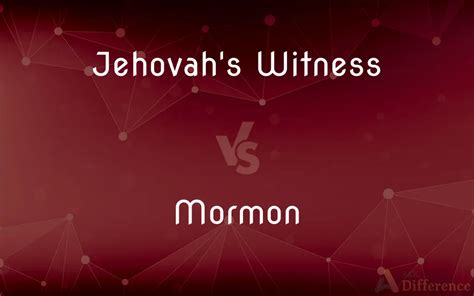The Jehovah's Witnesses and the Mormons are two of the most well-known Christian denominations in the world. While they share some similarities, they also have many differences in their beliefs, practices, and organizational structures. Understanding these differences can help you make informed decisions about your own faith and provide insight into the unique aspects of each denomination.
The Jehovah's Witnesses, also known as the Watchtower Society, were founded in the late 19th century by Charles Taze Russell. The organization is headquartered in Brooklyn, New York, and has over 8 million members worldwide. The Mormons, officially known as the Church of Jesus Christ of Latter-day Saints (LDS), were founded in the early 19th century by Joseph Smith. The church is headquartered in Salt Lake City, Utah, and has over 16 million members worldwide.
1. Beliefs About God

One of the most significant differences between Jehovah's Witnesses and Mormons is their understanding of God. Jehovah's Witnesses believe in a single, all-powerful God who is the creator of the universe. They reject the concept of the Trinity, which is central to many Christian denominations, and instead believe that Jesus is a separate entity from God, subordinate to Him.
Mormons, on the other hand, believe in a Godhead consisting of three separate beings: God the Father, Jesus Christ, and the Holy Ghost. They believe that these three beings are one in purpose and unity but are separate entities. Mormons also believe that God is a physical being with a body of flesh and bone, while Jehovah's Witnesses reject this idea.
Key Scripture: Jehovah's Witnesses - Psalm 83:18; Mormons - Doctrine and Covenants 130:22-23
2. Salvation and Afterlife

Another significant difference between Jehovah's Witnesses and Mormons is their understanding of salvation and the afterlife. Jehovah's Witnesses believe that salvation is achieved through faith in Jesus Christ and obedience to God's laws. They reject the concept of hell and believe that those who do not follow God's laws will be annihilated, or destroyed, rather than suffer eternal torment.
Mormons, on the other hand, believe in a more complex afterlife, with multiple levels of heaven and a chance for individuals to progress from one level to another. They believe that salvation is achieved through faith in Jesus Christ, repentance, baptism, receiving the gift of the Holy Ghost, and enduring to the end. Mormons also believe in a concept called "eternal progression," which suggests that individuals can continue to learn and grow in the afterlife.
Key Scripture: Jehovah's Witnesses - Romans 5:8; Mormons - 2 Nephi 9:10-16
3. Scripture and Authority

Jehovah's Witnesses and Mormons have different views on scripture and authority. Jehovah's Witnesses believe that the Bible is the ultimate authority and that it should be interpreted literally. They reject many Christian traditions and holidays, such as Christmas and Easter, which they believe are rooted in paganism.
Mormons, on the other hand, believe in a concept called "continuing revelation," which suggests that God continues to reveal new truths to His prophets. They believe in the Bible, as well as other scriptures such as the Book of Mormon and the Doctrine and Covenants, which are unique to their faith. Mormons also believe in a living prophet who serves as the leader of their church and receives guidance from God.
Key Scripture: Jehovah's Witnesses - 2 Timothy 3:16; Mormons - Doctrine and Covenants 68:4
4. Worship and Practices

Jehovah's Witnesses and Mormons have different worship styles and practices. Jehovah's Witnesses meet in Kingdom Halls, which are simple, unadorned buildings that are designed for worship and study. They believe in a simple, informal worship style, with no ritual or ceremony.
Mormons, on the other hand, meet in temples, which are ornate, elaborate buildings that are considered sacred. They believe in a more formal worship style, with ritual and ceremony playing a significant role in their services. Mormons also practice baptism for the dead, which involves baptizing individuals on behalf of deceased ancestors.
Key Scripture: Jehovah's Witnesses - 1 Corinthians 11:20-22; Mormons - Doctrine and Covenants 128:12
5. Organization and Leadership

Jehovah's Witnesses and Mormons have different organizational structures and leadership styles. Jehovah's Witnesses are led by a governing body of elders who are based in Brooklyn, New York. They believe in a flat organizational structure, with no hierarchical leadership.
Mormons, on the other hand, are led by a president and a group of apostles who are based in Salt Lake City, Utah. They believe in a hierarchical leadership structure, with the president serving as the prophet and leader of the church.
Key Scripture: Jehovah's Witnesses - 1 Corinthians 12:28; Mormons - Doctrine and Covenants 107:22






What is the main difference between Jehovah's Witnesses and Mormons?
+The main difference between Jehovah's Witnesses and Mormons is their understanding of God. Jehovah's Witnesses believe in a single, all-powerful God, while Mormons believe in a Godhead consisting of three separate beings: God the Father, Jesus Christ, and the Holy Ghost.
What is the Jehovah's Witnesses' view on salvation?
+Jehovah's Witnesses believe that salvation is achieved through faith in Jesus Christ and obedience to God's laws. They reject the concept of hell and believe that those who do not follow God's laws will be annihilated, or destroyed, rather than suffer eternal torment.
What is the Mormon view on scripture and authority?
+Mormons believe in a concept called "continuing revelation," which suggests that God continues to reveal new truths to His prophets. They believe in the Bible, as well as other scriptures such as the Book of Mormon and the Doctrine and Covenants, which are unique to their faith.
In conclusion, Jehovah's Witnesses and Mormons have many differences in their beliefs, practices, and organizational structures. Understanding these differences can help you make informed decisions about your own faith and provide insight into the unique aspects of each denomination.
